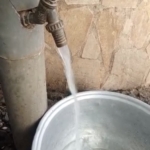
The Integrated Social Development Centre (ISODEC) and the Africa Water Justice Network (AWJN) say the Ghana Water Company Limited’s (GWCL) plan to increase water tariffs by 280% is unfair and should not be justified by the impact of illegal mining (galamsey).
In a joint statement issued on Wednesday, September 10, the two groups said they were “deeply concerned” about GWCL’s request to the Public Utilities Regulatory Commission (PURC).
The company has argued that rising treatment costs due to galamsey and pollution make the increase necessary.
While acknowledging the severe threat posed by illegal mining, ISODEC and AWJN rejected the idea that higher tariffs were the solution.
“The devastation caused by illegal mining is real, but the solution lies not in tariff adjustments,” they said. “Galamsey must be treated as a national security emergency requiring decisive government intervention. Citizens cannot be made to pay for the state’s failure to curb an existential threat to our rivers and ecosystems.”
The groups argued that GWCL must first improve its efficiency before asking citizens to pay more.
They pointed to a steep rise in non-revenue water, treated water lost through leakages, theft, or poor metering, which increased from 39.1% in 2020 to 49.9% in 2024.
“This is two to three times higher than international best practice,” the statement noted. “Until this is addressed, tariff hikes alone will not solve GWCL’s financial woes.”
ISODEC and AWJN also criticised the ongoing costs of the Teshie Desalination Plant, which they said drains GWCL’s finances.
The company pays the private operator US$1.4 million in capacity charges each month, as well as millions of cedis in electricity bills.
“Water purchased from the plant costs GWCL GH₵6.50 per cubic metre, yet it is sold to the public at just GH₵1.50,” they explained. “This lopsided agreement places an unbearable financial burden on GWCL that tariff hikes cannot sustainably cover.”
The statement further blamed political interference and questionable procurement deals for weakening GWCL’s finances. It cited the example of a GH₵1.3 million monthly internet contract linked to a former security chief.
“Opaquely awarded contracts expose GWCL to financial losses, and citizens should not be made to pay for this,” they said.
The groups proposed steps to fix the water sector, including reducing losses, reviewing the desalination deal, creating a Water Solidarity Fund financed by oil and mining revenues, and strengthening transparency in procurement.
They reminded the PURC that it regulates water not just for “customers” but for “people and rightsholders whose human right to water must be protected above all commercial considerations.”
ISODEC and AWJN urged the PURC to reject the tariff hike in its current form.
“To approve a 280% tariff increase without first addressing structural inefficiencies, exploitative contracts, and the national security threat of galamsey would be grossly unjust and a betrayal of the public trust,” they warned.